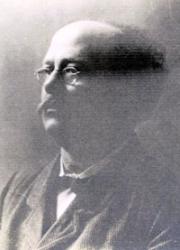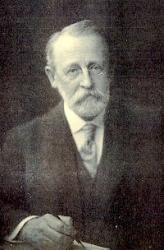Planning worship?
Check out our sister site, ZeteoSearch.org,
for 20+ additional resources related to your search.
- |
User Links
Person Results
Clement Cotterill Scholefield

1839 - 1904 Person Name: Rev. C. C. Scholefield Composer of "ST. MARY CRAY" in The Smaller Hymnal Rev. Clement C. Scholefield (b. Edgbaston, near Birmingham, Warwickshire, England, 1839; d. Goldalming, Surrey, England, 1904) Educated at St. John's College, Cambridge, he was ordained in the Church of England in 1867. He served at Hove, Brighton, St. Peter's in Kensington (1869-1879), and briefly at St. Luke's in Chelsea. From 1880 to 1890 he was chaplain at Eton College and from 1890 to 1895 vicar of Holy Trinity in Knightsbridge. Mainly self-taught as a musician, Scholefield became an accomplished pianist and composed some songs and hymn tunes.
Bert Polman
Clement Cotterill Scholefield
John Farmer

1836 - 1901 Composer of "ROBERTS (FARMER)" in The Sanctuary Hymnal, published by Order of the General Conference of the United Brethren in Christ Born: August 16, 1835, Nottingham, England.
Died: July 17, 1901, at his home in Oxford, England.
Buried: St. Sepulchre’s Cemetery, Jericho, Oxford, England.
Eldest child of butcher John Farmer and milliner Mary Blackshaw Farmer, John learned to play the piano, violin, and harp when young. He was apprenticed to his uncle Henry Farmer, an organist, composer, and music teacher with a music and musical instrument business in Nottingham. At age 14, John went to study at the Leipzig Conservatory, then three years later under Andreas Spaeth in Coburg for a year. He returned to England in 1853, and entered his father’s lace business. After his mother’s death in 1856, he went to Zürich, Switzerland, where he taught music. He returned to England again in 1861, and became music master of Harrow School in 1864, staying there until 1885. He then accepted an invitation to become organist at at Balliol College, Oxford, where he founded the Balliol Concerts.
During his career, Farmer composed oratorios, cantatas, church music, chamber music and numerous school songs, especially for Harrow School. One of his best known compositions was "Forty Years On," which he wrote at Harrow in 1872. While at Balliol, he composed Warwick School’s first school song, "Here’s a Song For All", in 1892. His other works include:
Cinderella
The oratorio Christ and His Soldiers
The cricketing song "Willow the King"
Music: FARMER
© The Cyber Hymnal™ (www.hymntime.com/tch)
John Farmer
Sigismund Thalberg
1812 - 1871 Person Name: Sigismond Thalberg Composer of "RUTHERFORD" in Evangelical Hymnal
Sigismund Thalberg
Herman von Berge
1871 - 1963 Author (stanza 2) of "Our Country's Voice Is Pleading" in The Hymnal of The Evangelical United Brethren Church Herman von Berge was born in Germany. He graduated from Colgate-Rochester Divinity School, a German Baptist seminary. He was a minister, a professor at Colgate-Rochester, a composer, and editor at Lorenz Music Publishing.
From "Life as a Baptist Pastor, Composer Brings Tribute to Von Berge" by Anne Hitch, Journal Herald Staff Writer, accessed March 19, 2022 from Dearest Irma: letters my grandmother saved" (https://dearestirma.wordpress.com/tag/herman-von-berge/)
Herman von Berge
Maria Frances (Hill) Anderson
1819 - 1895 Person Name: Maria F. Anderson Author of "Our Country's Voice is Pleading" in Service Songs for Young People's Societies, Sunday Schools and Church Prayer Meetings Anderson, Maria Frances. (Paris, France, January 30, 1819--October 13, 1895, Rosemont, Pennsylvania). Baptist. Daughter of Thomas F. Hill of Exeter, England. Married Rev. George W. Anderson, 1847. Author of several works on Baptists and missions for which she often used the pen name, L.M.N. Asked by George B. Ide, pastor of First Baptist Church, Philadelphia, to write a home mission hymn for the Baptist Harp (1849) in the same meter as Bishop Heber's "From Greenland's icy mountains." This hymn, "Our country's voice is pleading" was first sung in a home mission meeting at that Philadelphia church soon after the Baptist Harp was published. Another hymn appearing in the same collection and subtitled "The Bereaved Husband" begins "Yes she is gone, yet do not thou The goodness of the Lord distrust."
--Deborah Carlton Loftis, DNAH Archives
===========================================
Anderson, Maria Frances, born in Paris, France, Jan. 30, 1819, and married to G. W. Anderson, Professor in the University of Lewisburg, Pennsylvania. Two of her hymns are given in the Baptist Harp, 1849. Of these— "Our country's voice is pleading," has come into common use. [Rev. F. M. Bird, M.A.]
--John Julian, Dictionary of Hymnology (1907)
=================
Anderson, Maria Frances, née Hill, p. 67, i., is the daughter of Thomas F. Hill, of Exeter, England, and a Baptist. She published in 1853 Jessie Carey, and in 1861, The Baptists in Sweden.
--John Julian, Dictionary of Hymnology, Appendix, Part II (1907)
=================
Maria Frances (Hill) Anderson
William W. Gilchrist

1846 - 1916 Arranger of "[SCHUBERT]" in The Hymnal Born: January 8, 1846, Jersey City, New Jersey.
Died: December 20, 1916, Easton, Pennsylvania.
Buried: Saint Thomas’ Episcopal Church, Fort Washington, Pennsylvania.
Gilchrist’s family moved to Philadelphia, Pennsylvania, when William was nine years old. He attended school there until the outbreak of the American civil war, when his father’s business failed and William had to seek other work. Having a good voice, he sang in choirs and choruses, first as a soprano, and later a smooth, flexible baritone. He began singing some of the principal parts in the Handel and Haydn Society, where his first real musical life began.
At age 19, Gilchrist began studying organ and voice with Professor H. A. Clarke, gradually concentrating on theory. At age 25, he spent a year in Cincinnati, Ohio, as organist and teacher, returning to Philadelphia to take post of choir master at St. Clement’s Protestant Episcopal Church. He later became conductor of the Mendelssohn Club, Tuesday Club of Wilmington, and Philadelphia Symphony Society.
Gilchrist was best known as a composer. His first success was in 1878, winning two prizes from the Abt Society of Philadelphia for best choruses for male voices. In 1881, he won three similar prizes from the Mendelssohn Glee Club of New York. In 1884, he took a $1,000 prize from the Cincinnati Festival Association; the judges included Saint-Saëns, Reinecke, and Theodore Thomas. This work was an elaborate setting of the Forty-Sixth Psalm, and was enthusiastically received. Gilchrist afterwards modified it and brought it out at the Philadelphia Festival in 1885.
Gilchrist also served as editor of the 1895 Presbyterian hymnal, as musical editor of The Magnificat in 1910, and wrote symphonies, chamber and choral music. His works include:
An Easter Idyll
Psalm 46 (New York: 1882)
One Hundred and Third Psalm
Ninetieth Psalm
Fifth Psalm
Prayer and Praise
De Profundis
The Rose (New York: 1887)
Ode to the Sun
A Christmas Idyll (Boston, Massachusetts: 1898)
The Lamb of God (New York: 1909)
www.hymntime.com/tch/
William W. Gilchrist
Robert H. McCartney
1844 - 1895 Person Name: R. H. McCartney Composer of "WESTWOOD" in The Hymnal of Praise
Robert H. McCartney
Tali Esen Morgan
1858 - 1958 Person Name: Tallie Morgan Composer of "[Our country's voice is pleading]" in Songs of the Peacemaker
Tali Esen Morgan


 My Starred Hymns
My Starred Hymns


